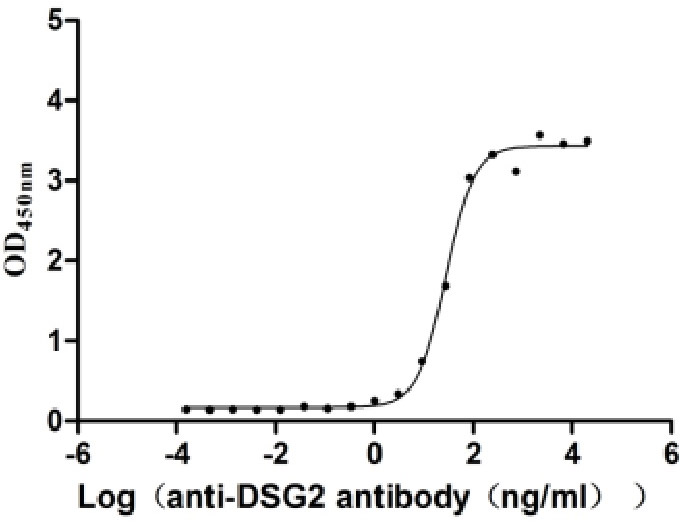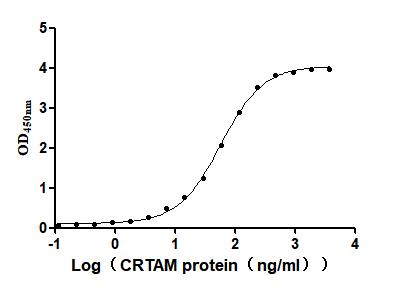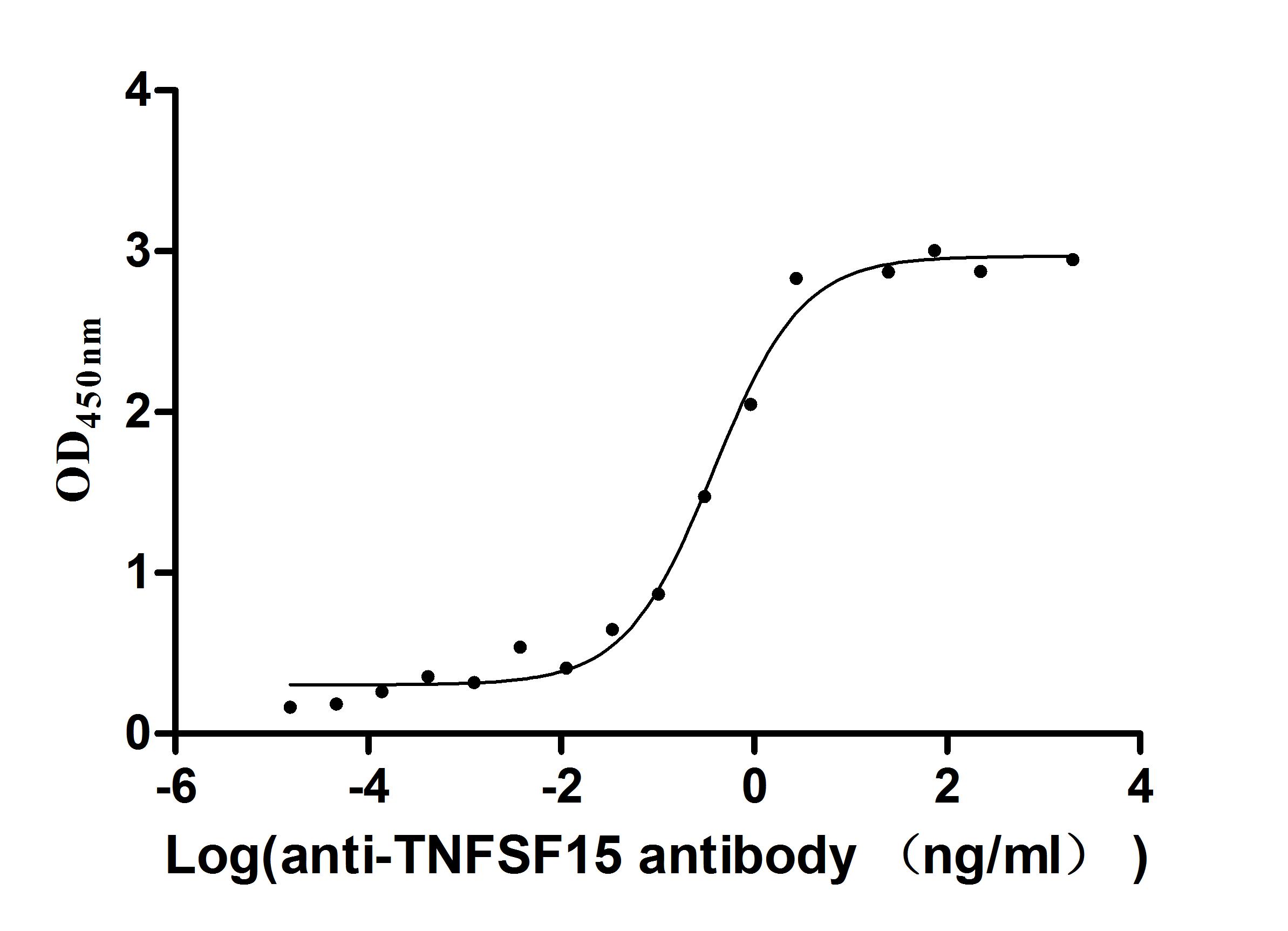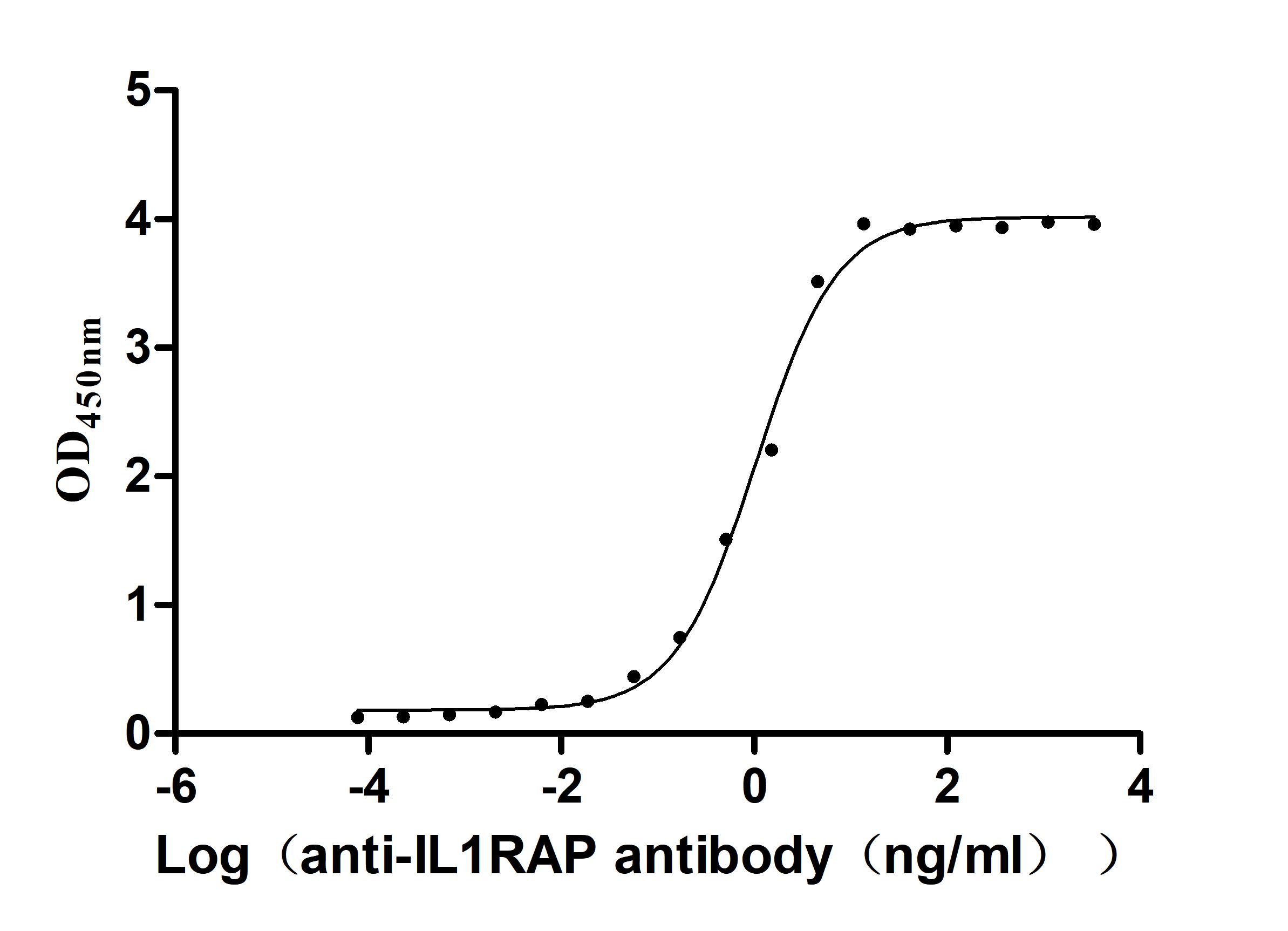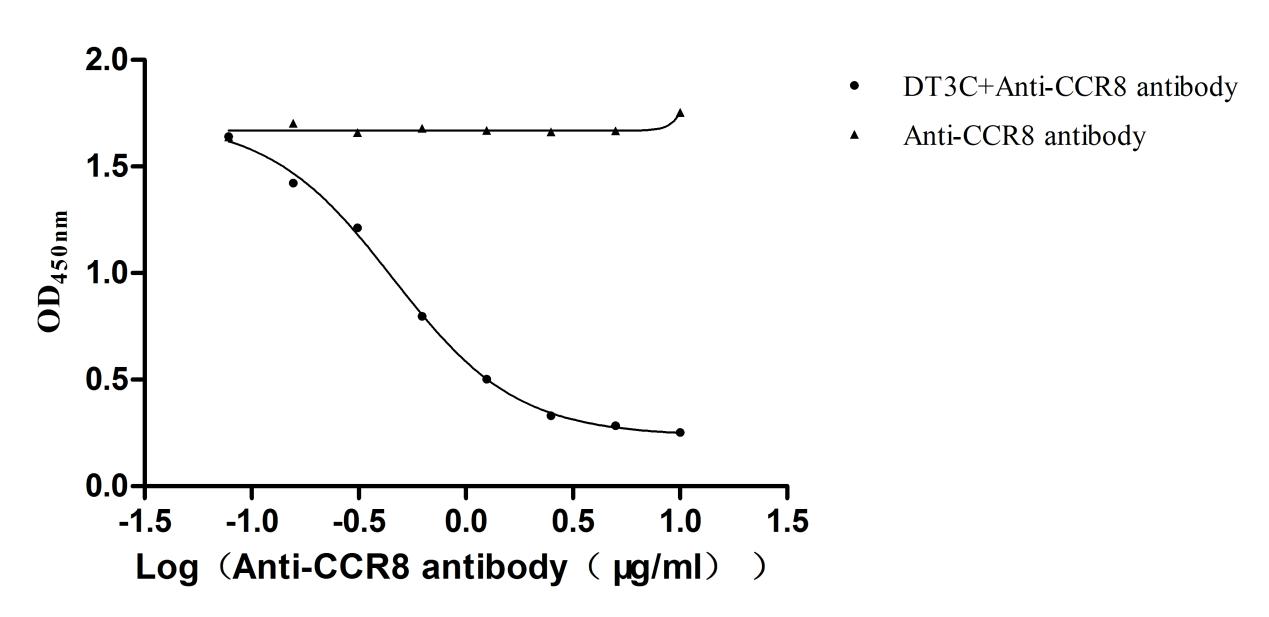Recombinant Human Centrosomal protein of 55 kDa (CEP55)
-
货号:CSB-YP709600HU
-
规格:
-
来源:Yeast
-
其他:
-
货号:CSB-EP709600HU
-
规格:
-
来源:E.coli
-
其他:
-
货号:CSB-EP709600HU-B
-
规格:
-
来源:E.coli
-
共轭:Avi-tag Biotinylated
E. coli biotin ligase (BirA) is highly specific in covalently attaching biotin to the 15 amino acid AviTag peptide. This recombinant protein was biotinylated in vivo by AviTag-BirA technology, which method is BriA catalyzes amide linkage between the biotin and the specific lysine of the AviTag.
-
其他:
-
货号:CSB-BP709600HU
-
规格:
-
来源:Baculovirus
-
其他:
-
货号:CSB-MP709600HU
-
规格:
-
来源:Mammalian cell
-
其他:
产品详情
-
纯度:>85% (SDS-PAGE)
-
基因名:CEP55
-
Uniprot No.:
-
别名:C10orf3; cancer/testis antigen 111; Centrosomal protein 55kDa; Centrosomal protein of 55 kDa; CEP 55; Cep55; CEP55_HUMAN; CT111; FLJ10540; Up regulated in colon cancer 6; Up-regulated in colon cancer 6; URCC 6; URCC6
-
种属:Homo sapiens (Human)
-
蛋白长度:full length protein
-
表达区域:1-464
-
氨基酸序列MSSRSTKDLI KSKWGSKPSN SKSETTLEKL KGEIAHLKTS VDEITSGKGK LTDKERHRLL EKIRVLEAEK EKNAYQLTEK DKEIQRLRDQ LKARYSTTTL LEQLEETTRE GERREQVLKA LSEEKDVLKQ QLSAATSRIA ELESKTNTLR LSQTVAPNCF NSSINNIHEM EIQLKDALEK NQQWLVYDQQ REVYVKGLLA KIFELEKKTE TAAHSLPQQT KKPESEGYLQ EEKQKCYNDL LASAKKDLEV ERQTITQLSF ELSEFRRKYE ETQKEVHNLN QLLYSQRRAD VQHLEDDRHK TEKIQKLREE NDIARGKLEE EKKRSEELLS QVQFLYTSLL KQQEEQTRVA LLEQQMQACT LDFENEKLDR QHVQHQLHVI LKELRKARNQ ITQLESLKQL HEFAITEPLV TFQGETENRE KVAASPKSPT AALNESLVEC PKCNIQYPAT EHRDLLVHVE YCSK
-
蛋白标签:Tag type will be determined during the manufacturing process.
The tag type will be determined during production process. If you have specified tag type, please tell us and we will develop the specified tag preferentially. -
产品提供形式:Lyophilized powder
Note: We will preferentially ship the format that we have in stock, however, if you have any special requirement for the format, please remark your requirement when placing the order, we will prepare according to your demand. -
复溶:We recommend that this vial be briefly centrifuged prior to opening to bring the contents to the bottom. Please reconstitute protein in deionized sterile water to a concentration of 0.1-1.0 mg/mL.We recommend to add 5-50% of glycerol (final concentration) and aliquot for long-term storage at -20℃/-80℃. Our default final concentration of glycerol is 50%. Customers could use it as reference.
-
储存条件:Store at -20°C/-80°C upon receipt, aliquoting is necessary for mutiple use. Avoid repeated freeze-thaw cycles.
-
保质期:The shelf life is related to many factors, storage state, buffer ingredients, storage temperature and the stability of the protein itself.
Generally, the shelf life of liquid form is 6 months at -20°C/-80°C. The shelf life of lyophilized form is 12 months at -20°C/-80°C. -
货期:Delivery time may differ from different purchasing way or location, please kindly consult your local distributors for specific delivery time.Note: All of our proteins are default shipped with normal blue ice packs, if you request to ship with dry ice, please communicate with us in advance and extra fees will be charged.
-
注意事项:Repeated freezing and thawing is not recommended. Store working aliquots at 4°C for up to one week.
-
Datasheet :Please contact us to get it.
相关产品
靶点详情
-
功能:Plays a role in mitotic exit and cytokinesis. Recruits PDCD6IP and TSG101 to midbody during cytokinesis. Required for successful completion of cytokinesis. Not required for microtubule nucleation. Plays a role in the development of the brain and kidney.
-
基因功能参考文献:
- A significant over expression of forkhead box protein M1 (FOXM1), polo-like kinase 1 (PLK1) and centrosomal protein 55 (CEP55) was observed in tumor samples compared to adjacent and normal bladder tissues, suggesting they may be potential candidate's biomarkers for early diagnosis and targets for cancer therapy. PMID: 30277841
- our data suggest that CEP55 can be used as a prognostic marker for osteosarcoma PMID: 29579156
- CEP55 was increased in lung cancer cells. PMID: 29750778
- whole-exome sequencing lead to identification of a homozygous nonsense mutation c.256C>T (p.Arg86*) in CEP55 (centrosomal protein of 55 kDa) in autosomal recessive Meckel syndrome fetus. PMID: 28295209
- CEP55 loss of function mutations likely underlie MARCH, a novel multiple congenital anomaly syndrome. PMID: 28264986
- A FAK-Src signaling pathway downstream of integrin-mediated cell adhesion was found to decelerate both PLK1 degradation and CEP55 accumulation at the midbody. These data identify the regulation of PLK1 and CEP55 as steps where integrins exert control over the cytokinetic abscission. PMID: 27127172
- Data suggest that USP9X as an integral component of centrosome where it functions to stabilize PCM1 and CEP55 and to promote centrosome biogenesis; N-terminal domain of USP9X appears to be responsible for physical association of USP9X with PCM1 and CEP55. (USP9X = ubiquitin-specific protease 9X; PCM1 = pericentriolar material 1 protein; CEP55 = 55kDa centrosomal protein) PMID: 28620049
- Aberrant CEP55 expression may predict unfavorable clinical outcomes in epithelial ovarian carcinoma (EOC) patients and play an important role in regulating invasion in ovarian cancer cells. Thus, CEP55 may serve as a prognostic marker and therapeutic target for EOC PMID: 26615423
- CEP55 plays a crucial role in promoting breast cancer cell proliferation and it might be a potential therapeutic target in breast cancer. PMID: 26902787
- In depth discussion of the functions of CEP55 across different effector pathways, and also its roles as a biomarker and driver of tumorigenesis, commemorating a decade of research on CEP55. [review] PMID: 25915844
- Which was required for FLJ10540/MMP-7 or FLJ10540/MMP-10 expressions. PMID: 25889801
- myotubularin-related protein 3 and myotubularin-related protein 4 may act as a bridge between CEP55 and polo-like kinase 1, ensuring proper CEP55 phosphorylation and regulating CEP55 recruitment to the midbody. PMID: 25659891
- CEP55 mRNA/protein expression was observed is specific to TCC of human urinary bladder and might be used as a diagnostic biomarker and vaccine target in development of BC specific immunotherapy. PMID: 25178936
- cellular proliferation was suppressed as a result of cell cycle arrest at the G2/M phase in CEP55-knockdown cells PMID: 24390615
- FLJ10540 may be critical regulator of disease progression in nasopharygeal carcinoma, and the underlying mechanism may involve in the osteopontin/CD44 pathway. PMID: 22591637
- At the midbody, BRCA2 influences the recruitment of endosomal sorting complex required for transport (ESCRT)-associated proteins, Alix and Tsg101, and formation of CEP55-Alix and CEP55-Tsg101 complexes during abscission. PMID: 22771033
- the existence of a p53-Plk1-Cep55 axis in which p53 negatively regulates expression of Cep55, through Plk1 which, in turn, is a positive regulator of Cep55 protein stability. PMID: 22184120
- Data provide strong evidence that CEP55 and HELLS may be used in conjunction with FOXM1 as a biomarker set for early cancer detection and indicators of malignant conversion and progression. PMID: 20400365
- Data show that Plk1 activity negatively regulates Cep55 to ensure orderly abscission factor recruitment and ensures that this occurs only once cell contraction has completed. PMID: 21079244
- Cep55 is stabilized in a phosphorylation- and Pin1-dependent manner. PMID: 19855176
- data suggest a possible involvement of CEP55 in centrosome-dependent cellular functions, such as centrosome duplication and/or cell cycle progression, or in the regulation of cytokinesis PMID: 16406728
- This study defines a cellular mechanism that links centralspindlin to Cep55, which, in turn, controls the midbody structure and membrane fusion at the terminal stage of cytokinesis. PMID: 16790497
- By forming a complex with phosphatidylinositol 3'-kinase, FLJ10540 activates the PI3-kinase/AKT proto-oncogene protein pathways, providing a mechanistic basis for FLJ10540-mediated oncogenesis. PMID: 17237822
- study shows that two proteins involved in HIV-1 budding-Tsg101, a subunit of the endosomal sorting complex required for transport I (ESCRT-I), & Alix, an ESCRT-associated protein-were recruited to the midbody during cytokinesis by interaction with Cep55 PMID: 17556548
- that ALIX and TSG101/ESCRT-I also bind a series of proteins involved in cytokinesis, including CEP55, CD2AP, ROCK1, and IQGAP1. PMID: 17853893
- the Cep55/Alix/ESCRT-III pathway has a role in cytokinesis and HIV-1 release PMID: 18641129
- crystal structure of the ESCRT and ALIX-binding region (EABR) of CEP55 bound to an ALIX peptide at a resolution of 2.0 angstroms; structure shows that EABR forms an aberrant dimeric parallel coiled coil PMID: 18948538
- FLJ10540 is not only an important prognostic factor but also a new therapeutic target in the FLJ10540/FOXM1/MMP-2 pathway for oral cavity squamous cell carcinoma treatment. PMID: 19525975
- protein could be detected in breast- and lung carcinoma 9but not normal) tissues PMID: 19609239
显示更多
收起更多
-
相关疾病:Multinucleated neurons, anhydramnios, renal dysplasia, cerebellar hypoplasia and hydranencephaly (MARCH)
-
亚细胞定位:Cytoplasm. Cytoplasm, cytoskeleton, microtubule organizing center, centrosome, centriole. Cytoplasm, cytoskeleton, microtubule organizing center, centrosome. Cleavage furrow. Midbody, Midbody ring.
-
组织特异性:Expressed in embryonic brain. Expressed in fetal brain ganglionic eminence, kidney tubules and multinucleate neurons in the temporal cortex. Expressed in adult brain, cerebellum, kidney tubules, intestine and muscles (at protein level). Widely expressed,
-
数据库链接:
HGNC: 1161
OMIM: 236500
KEGG: hsa:55165
STRING: 9606.ENSP00000360540
UniGene: Hs.14559
Most popular with customers
-
Recombinant Human T-cell surface protein tactile (CD96), partial (Active)
Express system: Mammalian cell
Species: Homo sapiens (Human)
-
Recombinant Rat Intestinal-type alkaline phosphatase 1 (Alpi) (Active)
Express system: Mammalian cell
Species: Rattus norvegicus (Rat)
-
Recombinant Human Desmoglein-2 (DSG2), partial (Active)
Express system: Mammalian cell
Species: Homo sapiens (Human)
-
Recombinant Mouse Cytotoxic and regulatory T-cell molecule (Crtam), partial (Active)
Express system: Mammalian cell
Species: Mus musculus (Mouse)
-
Express system: Mammalian cell
Species: Homo sapiens (Human)
-
Recombinant Macaca fascicularis Interleukin 1 receptor accessory protein(IL1RAP), partial (Active)
Express system: Mammalian cell
Species: Macaca fascicularis (Crab-eating macaque) (Cynomolgus monkey)
-
Recombinant DT3C (Diphtheria toxin & spg 3C domain) for Antibody Internalization Assay (Active)
Express system: E.coli
Species: N/A


-AC1.jpg)

